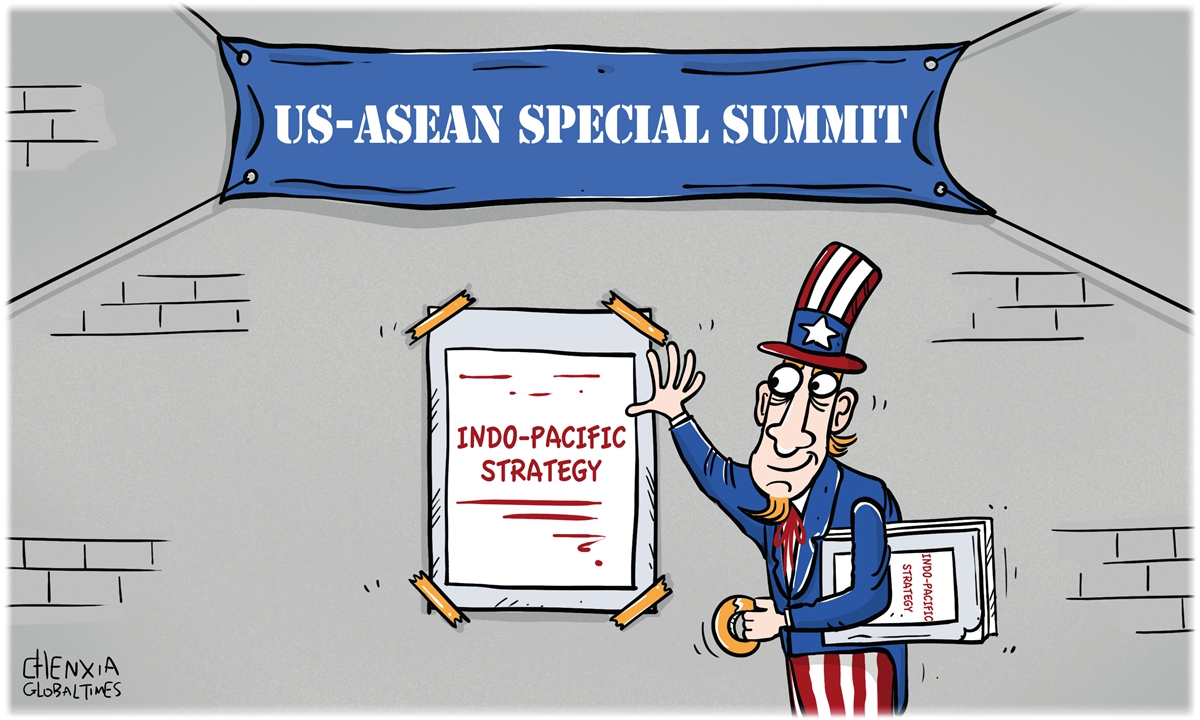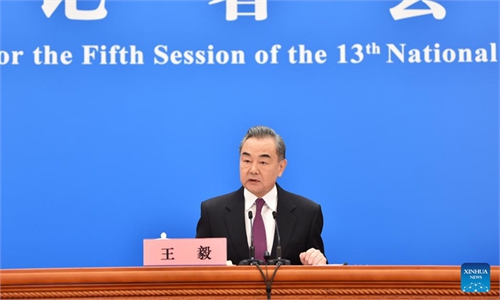
Illustration: Chen Xia/GT
The White House announced recently that US President Joe Biden will host the leaders of the ASEAN at a special summit in Washington later this month, despite a potential postponement. This summit is viewed as a way of demonstrating US commitment to the block on the 45th anniversary of US-ASEAN relations. For this special summit, the main topic is the US Indo-Pacific Strategy launched in February.
The strategy itself is not a new topic, as an old version was released during the Trump era. Comparing the two strategies, however, the new one has a more complete framework and more specific measures. The biggest change is that the US seeks to package this strategy, which is very military in nature, into a comprehensive regional strategy that also includes economic aspects of concern to regional countries.
Unlike the US, the vast majority of countries in this region view stability and sustainability of development as the main goals of governance, while the US is to maintain its leadership as the starting point. The US' Indo-Pacific Strategy is obviously not to ASEAN's liking. The US has to repackage the strategy to attract regional countries.
2022 is an "Indo-Pacific year" of the Biden administration, as Biden himself will possibly visit Asia in May, with the important task of marketing this upgraded version and pull ASEAN into it.
This new strategy will also lead to an increase in US follow-up activities in the Asia-Pacific region. US national security adviser Jake Sullivan has made it clear that instead of bringing about a fundamental transformation of China itself, the objective of the Biden administration is to shape the international environment so that it is more favorable to the interests and values of the US and its allies.
To shape such an environment, the US has been engaging with various ASEAN countries in more ways than just regular summits, as noted in a Politico report last December. Kurt Campbell, the US National Security Council's coordinator for Indo-Pacific affairs, has held monthly meetings with ambassadors from ASEAN countries in the US - gatherings that didn't take place during the last two administrations. A major reason for these conversations is to shore up the US partnership with countries in China's neighborhood. In addition, there are other Track 1.5 and Track 2 dialogues, all designed to shape the environment in favor of the US and facilitate defeating China.
To overcome its weakness in economic ties with the region, the US intends to introduce a new Indo-Pacific economic framework, probably before the special summit. However, this framework is unlikely to include incentives that would actually strengthen the US-ASEAN cooperation or even move ASEAN to join the US Indo-Pacific Strategy, because the US strategic agenda for this region is to pursue military dominance, without the capacity or willingness to make significant contributions to the region's economic development. Therefore, no matter how magnificent the economic framework seems to be, ASEAN countries will not be moved by it, and US-ASEAN economic cooperation will not have substantial or long-lasting development.
ASEAN has always adhered to the strategy of not taking sides and maintaining a balance between China and the US, not only for economic interests, but also for national security interests and the need for regional peace and stability. If one takes the US side, the damage to the ASEAN countries' own security will be self-evident. And for all the countries that the US attempts to collect, China never forces them to take sides or makes any diplomatic efforts on this issue.
In the big game between China and the US, China's strategy is "you play yours, I'll play mine." The US is playing the cards of containment and cold war in the Asia-Pacific region, while China is playing the cards of cooperation and development, transcending systemic differences rather than drawing lines along ideology. China has the confidence to attract more and more countries with cooperation and development, while the US, which insists on containment and cold war tactics, will certainly be frustrated, subject to soft or hard resistance.
The author is a senior research fellow at the China Institute of International Studies. opinion@globaltimes.com.cn

